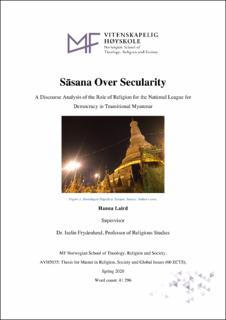| dc.contributor.author | Laird, Hanna | |
| dc.date.accessioned | 2020-10-16T07:36:31Z | |
| dc.date.available | 2020-10-16T07:36:31Z | |
| dc.date.issued | 2020 | |
| dc.identifier.uri | https://hdl.handle.net/11250/2683200 | |
| dc.description.abstract | The study of religion within the field of political science is growing. This thesis aims to contribute by studying religion and Myanmar’s leading (and currently governing) pro-democracy party, the National League for Democracy (NLD). The NLD is a valuable case, as Buddhism has played an important role in Burmese politics, including in the democratization efforts. Religious minorities have suffered the consequences of this - as seen in the ‘Rohingya crisis’. Furthermore, little research has been done on the NLD since Myanmar began to transition to democracy in 2011.
This thesis addresses the research question: What is the role of religion for the NLD in transitional Myanmar? The two sub-research questions are:
1. What is the NLD’s official stance on religion?
2. How does religion impact the NLD’s policy choices?
This thesis is based on empirical evidence gathered through fieldwork in Myanmar. A discourse analysis of twelve in-depth interviews with Burmese politicians, political activists and monks leads to three hypotheses:
1. The NLD does not have a meaningful formal stance on religion. It envisions itself as a party adhering to 'liberal' democratic values, including being ‘secular’.
2. Buddhism has an unofficially privileged position in the NLD. The NLD engages with Buddhist sources of legitimacy and actively defends its relationship to Buddhism – as seen by the removal of its Muslim candidates in the 2015 election.
3. The NLD’s relationship with religion is largely contextual. The unofficial privileging of Buddhism appears when political adversaries accuse the NLD of not being able to protect Buddhism.
These findings have theoretical implications and demonstrate that studies of politics in Buddhist contexts must be cognizant of the continued importance of the state being seen as a protector of Buddhism, and that Western political conceptions (such as secularity) cannot neatly be applied to Buddhist contexts. | en_US |
| dc.language.iso | eng | en_US |
| dc.subject | Myanmar | en_US |
| dc.subject | National League for Democracy | en_US |
| dc.subject | religion | en_US |
| dc.subject | Buddhisme | en_US |
| dc.title | Sāsana Over Secularity : A Discourse Analysis of the Role of Religion for the National League for Democracy in Transitional Myanmar | en_US |
| dc.type | Master thesis | en_US |
| dc.subject.nsi | VDP::Samfunnsvitenskap: 200::Statsvitenskap og organisasjonsteori: 240 | en_US |
| dc.subject.nsi | VDP::Humaniora: 000::Teologi og religionsvitenskap: 150::Religionsvitenskap, religionshistorie: 153 | en_US |
| dc.source.pagenumber | 130 | en_US |
